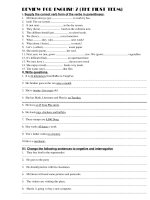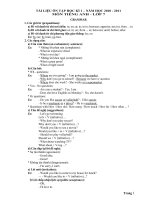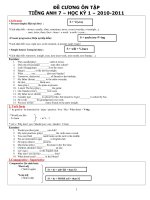ĐỀ CƯƠNG ÔN TẬP ANH 7 LẦN 3
Bạn đang xem bản rút gọn của tài liệu. Xem và tải ngay bản đầy đủ của tài liệu tại đây (127.07 KB, 5 trang )
<span class='text_page_counter'>(1)</span><div class='page_container' data-page=1>
<b>ĐỀ CƯƠNG ÔN TẬP ANH 7 LẦN 3</b>
<i><b>(Thời gian làm bài từ 16/3 đến ngày 21/3)</b></i>
<b>Lưu ý: Đề cương ôn tập lần 1 và lần 2 đã có trên trang web của nhà trường, các</b>
em truy cập địa chỉ website để down về làm nhé:
/>
<b>1. Used to: (Chỉ thói quen trong quá khứ)</b>
<b>“Used to” is to talk about past habits. It has the same form in all persons,</b>
singular and plural. It forms its negative and interrogative form with did.
- Diễn tả thói quen trong quá khứ nhưng khơng cịn liên quan đến hiện tại
Ex: I used to cry when I was a baby.
( Tôi đã từng khóc khi tơi cịn nhỏ nhưng bây giờ tơi khơng cịn khóc nữa)
I didn’t use to sleep late.
Did you use to sleep late?
<b>2. Distance</b>
How far is it from ... to ...?
It is about + km (from ... to ...)
Ex:
A: How far is it from your house to school?
B: It’s about 2 kilometers
<b>3. Dạng bị động của các thì đã học</b>
<i>1. The present simple passive. Bị động hiện tại đơn</i>
<b>Examples: - Many precious relics are displayed in the Temple of</b>
Literature.
- Many old trees and beautiful flowers are taken care of by the gardeners.
<i>2. The past simple passive: Bị động quá khứ đơn</i>
<b>I. Find the word which has a different sound in underlined part.</b>
1. A. came B. lake C. station D. start
2. A. ancient B. radio C. village D. nature
<b>PART 1: GRAMMAR REVIEW</b>
<b>(+) S + be (am/ is/ are) + past participle</b>
<b>(-) S + be (am/ is/ are) not + past participle</b>
<b>(?) Be (Am/ Is/ Are)+ S + past participle?</b>
<b>(+) S + be (was/ were) + past participle</b>
<b>(-) S + be (was/ were) not + past participle</b>
<b>(?) Be (Was/ Were)+ S + past participle?</b>
</div>
<span class='text_page_counter'>(2)</span><div class='page_container' data-page=2>
3. A. break B. head C. bread D. heavy
4. A. wait B. said C. maid D. sail
5. A. train B. wait C. said D. paid
6. A. sailing B. railway C. brainstorm D. captain
7. A. safety B. chat C. taste D. waste
8. A. centre B. let C. belt D. security
9. A. safety B. traffic C. station D. plane
<b>II. Find the odd one out A, B, C or D.</b>
1. A. sick B. temperature C. tired D. weak
2. A. flu B. stomachache C. allergy D. fat
3. A. sleep B. happy C. live D. smile
4. A. cough B. headache C. weak D. sore throat
5. A. sunburn B. toothache C. earache D. unhealthy
<b>III.</b> <b>Choose the correct answer by circling A, B, C or D.</b>
1. Linda used to morning exercise when she got up early.
A. did B. does C. doing D. do
2. My mum the bus to work every day, but I cycle.
A. catches B. drives C. goes D. runs
3. You should look right and left when you go the road.
A. down B. across C. up D. along
4. Bus is the main public in Viet Nam.
A.travel B. tricycle C. transport D. vehicle
5. The play was so boring. , An saw it from beginning to end.
A. Therefore B. Despite C. However D. Although
6. She’s sure that they will find the film .
A. entertaining B. entertain C. entertainment D. entertained
7. - “Do you like seeing a film?” - “ ”
A. No, I don’t like it at all B. Sure. What film shall we see?
C. Who is in it? D. I’m sorry, I can’t.
8. being frightened by the images, Lan still liked the film so much.
A. In spite B. Despite C. Although D. Nevertheless
9. is La Tomatina celebrated? - Every August.
A. Where B. Why C. When D. Which
10.My father liked the of that singer.
A. perform B. performer C. performance D. performing
11.Does your bike ever down on the way to school?
A. break B. take C. do D. turn
12.I go on foot when I was in primary school.
A. used to B. break C. can D. may
13.Give a before you turn left or right.
A. sign B. turn C. sound D. signal
</div>
<span class='text_page_counter'>(3)</span><div class='page_container' data-page=3>
A. attend B. join C. perform D. appear
15. the film was gripping, Tom slept from beginning to end.
A. Therefore B. Despite C. However D. Although
16.Khue Van Pavilion is as the symbol of HN city.
A. regarded B. surrounded C. expected D. considered
<b>IV.</b> <b>Rewrite each sentence or question so it has the same meaning. Use</b>
<b>“Used to”.</b>
<i><b>Ex: I was in the school tennis team.</b></i>
<i><b>→ I used to be in the school tennis team.</b></i>
1. Anna had long hair when she was at school.
Anna used...
2. Mary didn’t listen when her teachers were speaking.
May didn’t use...
3. Ricardo got up at 6.00 when he was training for the Olympics.
Ricardo used...
4. What did you usually do on Saturday evenings?
What did you use?...
5. Sophie was afraid of dogs when she was a little girl.
Sophie used...
<b>V. Rewrite these cues below to complete a meaningful sentences using</b>
<b>“used to”.</b>
1. Susan/ have/ a dog? <i><b>(question)</b></i>
...
2. people/ use/ mobile phones <i><b>(negative)</b></i>
<i>...</i>
3. he/ go/ swimming <i><b>(statement)</b></i>
<i>...</i>
4. they/ like/ jazz music? <i><b>(question)</b></i>
<i>...</i>
5. Olga’s family/ live/ in Moscow. <i><b>(statement)</b></i>
<i>...</i>
<b>VI.</b> <b>Write sentences with “how far” then answer using “it”. Use these</b>
<b>cues.</b>
<b>Ex: </b> 1. 120 km/ Ho Chi Minh City/ Vung Tau
<b>Answer: How far is it from Ho Chi Minh City to Vung Tau?</b>
<b> It is about 120 km</b>
1. your house/ Ben Thanh market// one kilometer.
………
2. post office/ bakery// 800 meters.
………
3. Ha Noi/ Hue// 680 kilometers.
</div>
<span class='text_page_counter'>(4)</span><div class='page_container' data-page=4>
………
5. Da Nang/ Ho Chi Minh city// 900 kilometers.
………
<b>VII. Read the following text carefully and choose the correct answer A, B,</b>
<b>C or D for each of the gap.</b>
When you are in Singapore, you can go about (1) taxi, by bus, or by
underground. I myself prefer the underground (2) it is fast, easy and
cheap. There are (3) buses and taxis in Singapore and one cannot drive
along the road (4) and without many stops, especially on Monday morning.
The underground is therefore usually quicker (5) taxis or buses. If you do not
know Singapore very well, it is difficult (6) the bus you want. You can
take a taxi, but it is (7) expensive than the underground or a bus. On
the underground, you find good maps that (8) you the names of the
stations and show you (9) to get to them, so (10) it is easy to find your
way.
1. A. by B. in C. at D. on
2. A. but B. because C. when D. so
3. A. few B. a lot C. many D. some
4. A. quick B. quickly C. quicker D. quickest
5. A. so B. like C. than D. as
6. A. find B. to find C. finding D. found
7. A. less B. more C. most D. much
8. A. tell B. told C. tells D. telling
9. A. who B. what C. when D. how
10.A. how B. that C. when D. where
<b>VIII. Supply the correct form of the verbs in brackets using the passive</b>
<b>voice (sử dụng dạng bị động của các thì đã học)</b>
1. They will not ……… (provide) pencils at the test, so please
bring your own.
2. A new university will ……… (establish) in our province in
the near future.
3. The Japanese Covered Bridge in Hoi An ……… (build) in the
16th century.
4. The Imperial Academy ……… (consider) the first university
in Viet Nam.
5. The site for Huong Pagoda ……… (discover) about 2000
years ago.
6. My brother ……… (graduate) from the University of
Melbourne in 2012.
</div>
<span class='text_page_counter'>(5)</span><div class='page_container' data-page=5></div>
<!--links-->
De cuong on tap Anh 7-HKII (hot)
- 9
- 872
- 13








